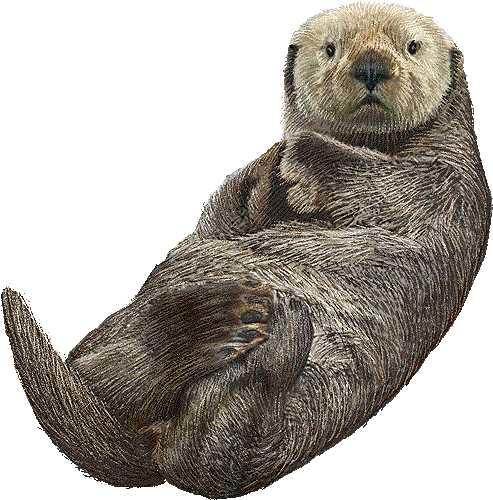
Karl S. Monroe
The Celebrities
Near dusk, on a chilly afternoon in late December. Few people are in the park. As I head out on the west boardwalk into the wetlands, a woman precedes me, walking her small dog on a leash. It’s near freezing and the boardwalk is getting slick; I walk slowly, stopping to look and listen. I notice little, except the ever-present sound of traffic hastening by on the far edge of the park. Market Street.
Nearing the viewing platform, I see the woman on her return, frozen in rapt attention, her dog tucked under her arm. Or she sees me, makes a small gesture and says, Look. On the outer shore of the hook is an otter, feeding on what appears to be a white-fleshed salmon. The otter is not floating on its back, using its chest as a portable dining table. The carcass is laid out on a four-by-four lodged in the mud. The otter’s eating style is, at once quick and nonchalant. As I watch I spot another observer a few yards off, standing warily on the shoreline. It is a great blue heron. On first notice I don’t think of it as watching. The woman and I share scant remarks. The social tension gets to be too much, and the great blue lifts off, gliding farther down shore. A few moments later the otter pauses, looks around, and shoves off, disappearing beneath the darkened lake.
I feel sheepish, fearing my large-scale movements and vocalizations have scared the otter off. I rue my disparaging expectation, my certainty that the woman’s dog would startle the creature and drive it away. But the dog was perfectly silent.
The woman and I stand awhile, wondering what else will happen. Do you hear him barking, she asks. I don’t hear anything. I watch as she scans the lake, and points to the otter swimming parallel to the shore, maybe ten yards out. I see only its head. And now I hear a series of tiny yips. Another otter head appears, and the pair swims farther out into the large bay. In the fading light their heads are nearly indistinguishable from the small, tight bodies of a flotilla of coots, gathering in for the night.
I notice that the great blue has crept back up shore. It’s standing near the otter’s sideboard, still laden with the salmon roast. The bird hops over for a bite, then steps back to swallow, almost as if it wants to preserve deniability.
I always feel reverence for herons, however often I spot them on my visits to the park, standing in the shallows. It takes patience to catch them striking their prey. They stand and stand and stand. Lifting a leg. Waiting. The head suddenly stabs into the water, then comes up with a flash of silvery fish or frog legs—but often you have no idea of the catch. I remain to watch this great blue for a while, but with a sense of chagrin. It challenges my belief that herons are noble. This one is feeding on carrion—fresh-killed, but carrion nonetheless.
I say goodbye to the woman with the dog and continue out to the end of the walk, where a large grated viewing platform overlooks the inner lagoon. It’s getting too dark to see anything. I stand thinking about the otters, which I have never seen here before. Trying to remember where I heard—I must have been here in the park, standing on the periphery of the crowd around one of the volunteer rangers—what had she said? That otters don’t actually reside at Juanita Bay, and that if they did, they are so ravenous that a single pair would deplete the food supply of most of the creatures that do live here. It makes you wonder just where the otters live.
For weeks I think about my encounter with the otters, feeling ennobled and grateful—humble, too. Had I been alone in the park, would I have seen anything at all—or would I have just blundered past in the descending darkness? I wonder what makes otters such a joy to watch. I might be more excited to see a beaver, just because these beasts are so reclusive. But beavers are dour. They lack the frolicking joy that seems to be the otter’s birthright, the gaiety that we ourselves might possess if we could just manage to stay in the moment.
When otters visit Juanita Bay, they’re just like celebrities dropping by the neighborhood. They consume more than their share. They are full of themselves, oblivious to their surroundings, bigger than life. And yet we crowd around, hoping to be touched, or at least to snap a picture. Afterward we tell ourselves how different our lives might be if we could just be more like them.
I don’t regard myself as a celebrity chaser. So I think about changing the way
I feel about that late afternoon in December. Maybe I should feel sullied, as
if I had lurked alongside a supermarket checkout counter, freeloading an entire
issue of US Weekly magazine. But their presence is ennobling. I still admire
otters: Maybe I could be one in my next life.
©2010 by Karl S. Monroe


